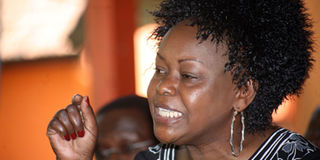MP set to table Victims Bill

Nominated legislator Millie Odhiambo plans to table a Bill in Parliament to protect and encourage victims of crimes to report their assailants December 09, 2011. FILE
What you need to know:
Key proposals:
Establishment of a Fund to help victims pursue the case or be compensated for the costs they incur in seeking treatment and justice.
Punishment of government officers who receive reports from victims but choose to ignore them.
Punishment of any employer who penalises an employee for taking time off to deal with assault cases.
Right for victims to be informed just as well as the accused on the state of their case.
- Programmes to ensure the public understands their rights and where to seek help.
A nominated legislator plans to table a Bill in Parliament to protect and encourage victims of crimes to report their assailants.
In a draft law authored by Millie Odhiambo, the government would be compelled to protect and finance victims who would otherwise be reluctant to report to the police because they might be targeted again or because of the costs involved in pursuing justice.
The Bill seeks to introduce the right to immediate physical protection and medical attention the assaulted whether the person is able to pay or not. Through what she calls the Victims Protection Trust Fund, victims would be put under government care.
“Medical examination and the treatment of victims of offences shall be free of charge and shall be done within 24 hours of the crime being reported or being discovered by law enforcement officers,” the Bill reads.
According to the MP, the draft law would consolidate all the provisions for witnesses and victims given in the Constitution and other previous Acts of Parliament because “we don’t have a broad spectrum law that deals with victims’ predicament".
“I am working on this Bill because the current justice system is not sensitive to victims of crime. The Constitution has so many good rights, but they all give an advantage to the accused and presume that the victim will be given protection anyway,” she told journalists Friday.
This week, Children’s Rights Organisation, Cradle, and the Kenya Women’s Parliamentary Association (Kewopa) have been organising public education campaigns to seek views from the public about the Bill.
While it may seem to duplicate the Witness Protection Act, some human rights lawyers argue that it would in fact complement it. The Act, passed earlier this year establishes the Victims Compensation Fund where witnesses and victims get restitution.
However, the compensation is only as long as the witnesses or victims are already on the witness protection programme.
“If this law is passed, we would have a cohesive legal framework to deal with protection. It would mean that some of the lengthy and discouraging procedure of seeking medical treatment first before pursuing justice will be eliminated,” said Mr Kiiru Kamau, a legal officer with Children rights Organisation Cradle.
In the current situation, people are asked to fill out assault forms commonly called P3 at a fee of Sh300. If the person is poor, the fee is a discouragement which is worsened by the few government doctors that have to see the victims to assess the nature of the attack. In Nairobi, there is only one such doctor who sees people twice a week.
Among the proposals the government shall be compelled to shield any victim from further risks whether the person reports the matter to the authorities or not. In fact, she proposes to punish any public officer who receives the report but decides to sit on it.
“I have been a victim of authorities before. I was attacked and when I reported the matter with helpful information, the police accused me of stage-managing the attack. This has to stop.”
She intends to table the Victim Protection Bill early next year.




